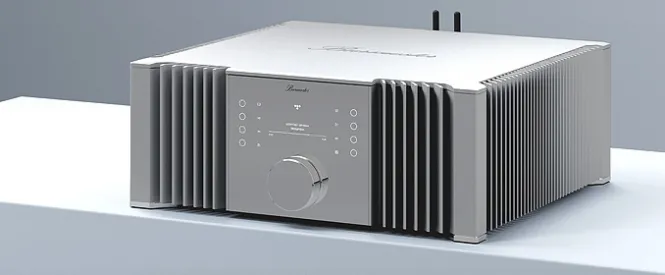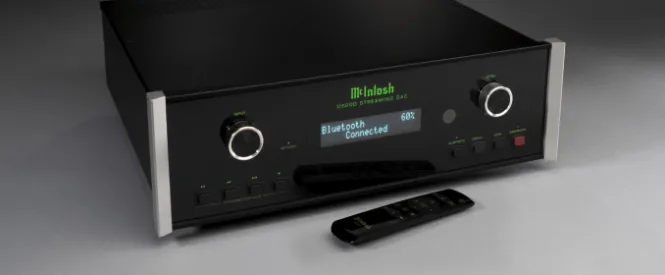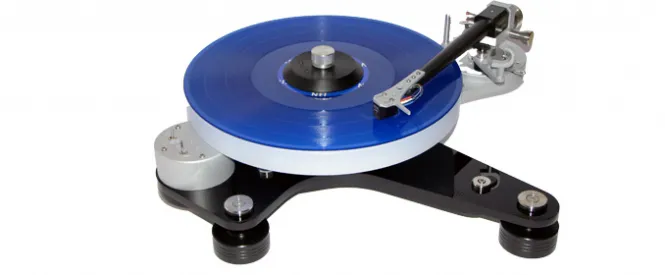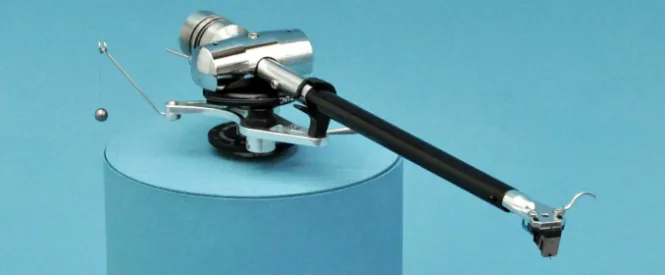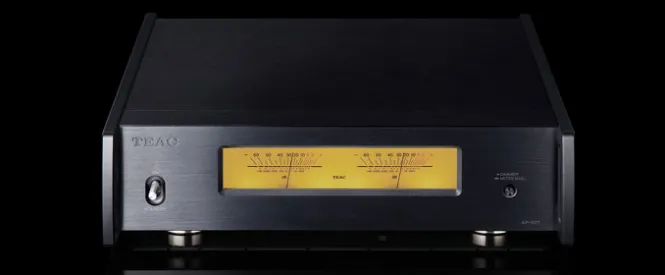Cyrus Phono Signature Phono Stage Review
James Michael Hughes is seriously impressed by this versatile new MM/MC phono preamplifier…
Cyrus Audio
Phono Signature Amplifier
£1,695
Not so long ago, I enthusiastically reviewed the new Cyrus i9-XR modular preamp/DAC and power amp in StereoNET and found it a most impressive combination. The i9-XR preamp features a high-quality built-in phono stage, but only for moving magnet cartridges…
For moving coil cartridges, Cyrus offers the Phono Signature from its more expensive Classic range. It's said to be a reference-standard component aimed at serious vinyl enthusiasts needing an adaptable, versatile high-quality unit that also facilitates quick easy comparisons. You can individually tailor impedance/capacitance/gain to suit the cartridge being used, and usefully, these parameters can be altered via the remote handset.
While many phono stages offer adjustable loading and gain, it's often via small fiddly internal DIP switches on the printed circuit board. Indeed, with some, you need to remove the casework to gain access. This makes adjustment awkward, so being able to change settings quickly and without fuss – and from your listening seat if necessary – makes the Phono Signature unusually user-friendly.
No fewer than four turntable inputs are offered. This might seem excessive, but what about enthusiasts running a single turntable fitted with several tonearms? In such situations, a phono stage with four individually adjustable inputs is just the job. Background noise is very low, but take care over positioning to minimise hum. Those having balanced line-level inputs on their amplifier should take advantage of the Cyrus Phono Signature's XLR outs.
Like other Cyrus components, the Phono Signature is housed in a rugged diecast case complete with heatsinks; this does get mildly warm during use. For those wanting even better performance, the optional £845 outboard PSX-R2 power supply can be added. Interestingly, Cyrus says that this external PSU makes more difference to the Phono Signature's sound than it does to other Cyrus components. However, as the PSX-R2 is an optional add-on, I did all my early listening without the outboard PSU.
GETTING GOING
For this review, I used Origin Live's Resolution turntable, Illustrious tonearm, and Transfiguration's Temper W low output MC cartridge, initially with a Moonriver 404 Reference integrated amplifier. The latter has its own built-in phono stage, which sounds excellent. However, on substituting the Cyrus Phono Signature, I immediately heard a small but worthwhile increase in space and depth. I initially used Cyrus' default settings, and the sound was very good.
Then things improved noticeably after I experimented with the different loading and gain settings. The adjustment options on the Phono Signature really seemed to make significant differences to the sound. In my experience with other phono stages, this isn't always the case. Being able to alter the settings via the remote handset is something I really appreciated. It's definitely a game-changer; no more having to settle for a compromise one-size-fits-all setting that hopefully covers every situation. Instead, you can quickly change settings as the need arises – even to suit individual LPs. For example, you can go from a higher to a lower impedance to slightly dampen down the liveliness of your cartridge on over-bright or harsh recordings.
Impedance loading options are 47k ohms for MM cartridges, then 47k ohms, 1k ohms, 500 ohms, 333 ohms, 150 ohms, 100 ohms, and 33 ohms for MC types. Capacitance options are 220pf, 3nf, 2nf, and 1nf. Four gain settings are offered: 40dB, 50dB, 60dB and 70dB. Although Cyrus seems to have thought of most things, I was slightly disappointed not to see a stereo/mono button. This is especially useful when playing mono LPs, as it reduces surface noise and pressing rumble. However, there is a 'warp' filter for the latter.
That aside, the Phono Signature offers plenty of options. I found the 70dB extra-high gain setting especially useful. While the low output MC cartridge I used – Transfiguration's Temper-W – works fine with 60dB gain, 70dB sounded noticeably crisper and more dynamic. This was particularly noticeable on LPs cut at a low level. At 70dB, the sound has noticeably greater immediacy and presence. The music projects more strongly, being more dynamic, full-bodied and detailed. Setting the Phono Signature's gain to 60dB then increasing amplifier volume by 10dB to compensate does not give the same result, subjectively. And to help you choose the correct gain setting, the Phono Signature has a meter on the LCD to indicate peak levels, which is a great feature!
THE LISTENING
Playing an early nineteen seventies Deutsche Grammophon LP of Beethoven's Variations for Piano by Wilhelm Kempff, I was struck by how much more colourful Kempff's piano sounded. The original recording, which isn't exactly one of DG's most detailed or dynamic, usually sounds a bit soft and bland. Having owned this LP for over thirty years, it's always been average in terms of impact and dynamics. Still, with the Phono Signature gain set at 70dB, the recording was transformed, making it more focused and vivid than I'd experienced before. Setting the gain back to 60dB, things went mushy and the sound lacked crispness and focus.
It was time to add the optional PSX-R2 power supply. This weighs in at a hefty 7kg and features a massive 300VA toroidal transformer. It plugs into the Phono Signature and immediately integrates with the main unit, so it is dead-easy to connect. Adding the PSX-R2 resulted in a subtler and more finely detailed sound with increased delicacy and refinement, plus extra depth and width to the soundstage. Things were more effortlessly holographic in terms of spatial presentation, with voices and instruments appearing less confined by the boundaries of the loudspeakers; they seemed to float free in a space between and around the enclosures.
The external power supply gave an easier, more relaxed feel to things then, yet brought no loss of detail or impact. Indeed, after adding the PSX-R2, the tonal balance became more open and natural. Any slight hints of upper mid-range glare and hardness were reduced. Dynamics felt more subtly graded, yet transient attack remained just as crisp and immediate. All in all, then, a very worthwhile difference!
While the Phono Signature minus the PSX-R2 offered less delicacy and finesse, the sound was still extremely good. You got a simpler and more forthright presentation; indeed, it's even possible that certain listeners might slightly prefer this, as the lack of subtlety adds more apparent excitement and impact. Yet on naturally miked recordings of classical music, the increased fine detail and refinement you get after adding the PSX-R2 is definitely beneficial. It's like comparing CD to an SACD of the same recording; the latter simply sounds more effortlessly detailed and natural.
Playing a rare 1971 recording of Frank Martin's Petite Symphonie Concertante with Paul Tortelier on the Unicorn label, I was really impressed by how detailed and full the recording sounded, given that it's an LP that can very easily sound thin and lacking in body. I've owned this disc for just over forty years and played it on many different systems. It's a recording that's never been issued on CD, and probably never will be. I always felt slightly disappointed the LP did not sound as quite good as it might have done, but via this Cyrus combo, it sounded excellent – better than I'd ever heard it before. The PSX-R2 enhanced spatial qualities in the recording I had never previously discerned. Thankfully, my LP pressing is still very quiet, albeit cut at a slightly low level.
This left me distinctly impressed with the Phono Signature. It is comfortably one of the best phono stages I've ever used, one able to get the best out of almost any cartridge, whether MM or MC. It can resolve subtle detail like few others. It produces a neutral and natural tonal quality while sounding crisp, detailed, and clean. There is nothing falsely warm or euphonic about its presentation, but at the same time, it doesn't sound dry or lacking in depth and breadth.
My best black plastic sounded great, but the lesser examples were also better than usual. At this point, I should confess. I employ a high-quality step-up transformer to noiselessly lift low-level signals for my own LP listening. I use a Music First transformer to boost the cartridge's output – it's my secret weapon! Using it helps make my vinyl records sound more solid, full-bodied, and firmer. However, with the Phono Signature, I felt I could dispense with the transformer without losing out.
As I regard the Music First step-up transformer as a near-indispensable piece of kit that I'd never want to be without, being able to use the Transfiguration cartridge straight into the Phono Signature and get outstanding results is mightily impressive. And adding the PSX-R2 brings things to an even higher level, so I'd strongly recommend partnering these items together. And being as they're separate components, you can always buy the phono stage first and then try the PSU later.
THE VERDICT

The new Cyrus Phono Signature sounds great and offers tremendous connectivity and flexibility in terms of its loading options, and convenience too. It is an essential audition if you're in the market for a mid-price phono stage; catch it if you can.
Visit Cyrus Audio for more information
Marc Rushton
StereoNET’s Founder and Publisher was born in England and raised on British Hi-Fi before moving to Australia. He developed an early love of music and playing bass guitar before discovering the studio and the other side of the mixing desk. After writing for print magazines, Marc saw the future in digital publishing and founded the first version of StereoNET in 1999.
Posted in: Amplifiers | Phono Preamplifiers | Applause Awards | 2021 | Hi-Fi
JOIN IN THE DISCUSSION
Want to share your opinion or get advice from other enthusiasts? Then head into the Message
Forums where thousands of other enthusiasts are communicating on a daily basis.
CLICK HERE FOR FREE MEMBERSHIP
Trending
applause awards
Each time StereoNET reviews a product, it is considered for an Applause Award. Winning one marks it out as a design of great quality and distinction – a special product in its class, on the grounds of either performance, value for money, or usually both.
Applause Awards are personally issued by StereoNET’s global Editor-in-Chief, David Price – who has over three decades of experience reviewing hi-fi products at the highest level – after consulting with our senior editorial team. They are not automatically given with all reviews, nor can manufacturers purchase them.
The StereoNET editorial team includes some of the world’s most experienced and respected hi-fi journalists with a vast wealth of knowledge. Some have edited popular English language hi-fi magazines, and others have been senior contributors to famous audio journals stretching back to the late 1970s. And we also employ professional IT and home theatre specialists who work at the cutting edge of today’s technology.
We believe that no other online hi-fi and home cinema resource offers such expert knowledge, so when StereoNET gives an Applause Award, it is a trustworthy hallmark of quality. Receiving such an award is the prerequisite to becoming eligible for our annual Product of the Year awards, awarded only to the finest designs in their respective categories. Buyers of hi-fi, home cinema, and headphones can be sure that a StereoNET Applause Award winner is worthy of your most serious attention.

